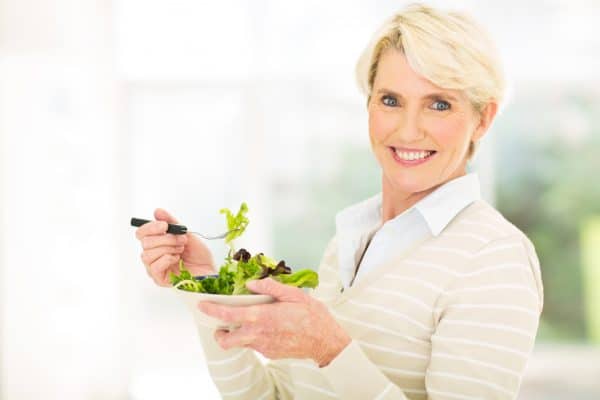If you are over 40 and going through some changes, you might be looking for the right menopause foods to include in your diet.
You may be one of the millions of women who are suffering with fatigue, weight gain, mood swings, brain fog, memory loss, poor sleep and a whole host of other unwanted symptoms!
As a nutritionist, I go by the Hippocrates approach of ‘Let food be thy medicine'. It's not always enough, and you may need hormone replacement (I'm certainly not against HRT if you need it), but I will always recommend changing your diet first to include some menopause foods to see how much it improves your symptoms.
I've seen time and time again how food can transform your health. And it's the same for hormones and the menopause transition.
Hormones need a steady stream of nutrients for them to work efficiently. Do they get what they need? Often not in our modern diet. Without the right nutrients you can start getting symptoms of hormone imbalance and your natural instinct is to go for a fast fix with the wrong foods (carbs, sugar, bad fats), making your symptoms even worse.
So what are my top menopause foods for nourishing these hormones so that they work for you and not against you?
1. Eat your broccoli! – the cruciferous family of vegetables are so beneficial for your hormones – they contain a special compound called Indole-3-Carbinol, which can help to detoxify excess oestrogen in the body. If your liver has a lot of toxins to deal with, things can back up and you could have excess oestrogen recirculated into your system. This can lead to ‘oestrogen dominance’ and symptoms include PMS, fibroids, breast tenderness and increased risk of cancer.
Try including 1-2 portions of cruciferous vegetables a day – eg. broccoli, cauliflower, cabbage, Brussel sprouts, kale, rocket, watercress, radish.
2. Keep hydrated – your body is around 60% water, so you need to keep levels up. Water intake includes fruit and veg, smoothies, tea and coffee, so you don’t need to drink huge amounts of plain water. You can lose your thirst response as you get older, so have a water bottle handy so you remember to drink!
3. Fat is your friend – good healthy fats are essential menopause foods! You need them for hormone production (especially as oestrogen declines), absorption of fat soluble vitamins (A,C,E,D) and keeping blood sugar stable, filling you up so you are not hungry between meals. The best fats to add to your diet include coconut oil, olive oil, grass fed butter (not the spreadable stuff!), avocado, nuts, seeds, oily fish.
4. Go organic – pesticides and fertilizers used to grow non-organic fruit and veg are now known to cause hormone disruption. Switch to organic fruit and vegetables which are free of chemicals, and contain lots more nutrients. Organic dairy and meat are much healthier choices too –they are mostly from free range animals that are fed a natural diet and are free of hormones and antibiotics.
5. Stop snacking – if you constantly snack or eat ‘little and often' your body always has a steady supply of glucose to use as energy. It never gets to use your fat stores! By leaving 4-6 hours between meals you will naturally burn more fat. Fasting overnight for 12-16 hours has a similar effect – great if you need to lose weight. DON”T do this though if you have any blood sugar issues or feel dizzy or faint between meals.
6. Get your fibre – one of the best menopause foods, fibre isfound in whole grains, veg, fruit, oats, beans and seeds. Fibre helps you get rid of waste, toxins and excess oestrogen. Aim for a minimum of 35g a day. That might look like this;
- 1 apple (5g)
- 1 cup lentils (15g)
- 2 tbsp flaxseeds (5g) or 1 tbsp chia seeds (5g)
- 1 cup broccoli (5g)
7. Increase your phyto-estrogens – these plant based compounds help you to regulate your own oestrogen levels, so they can be really helpful for PMS and menopause symptoms. The biggest source is soy (organic) and flaxseeds (or linseeds), while lentils and chickpeas have some too.
Try including organic soy milk, tofu or edamame beans, plus 2 tablespoons of freshly milled flaxseeds a day into your diet (try them in smoothies, soups, stews, porridge, yoghurt etc).
8. Go alcohol-free for a few nights a week – alcohol may be your stress relief at the end of your day but it's not doing your hormones any good! Not only is it a known trigger for hot flushes, it also messes with your blood sugar, making you more likely to store fat, interrupt your sleep and make you groggy the next day. Try more nights OFF than ON, and stick to red wine which at least has some polyphenols in it.
Check out my 30 Days to Happy Hormones programme for a structured plan to help to balance your hormones and make you feel more normal again.
And don't forget to Click Here to download your FREE Hormone Balancing Guide For Women Over 40!

